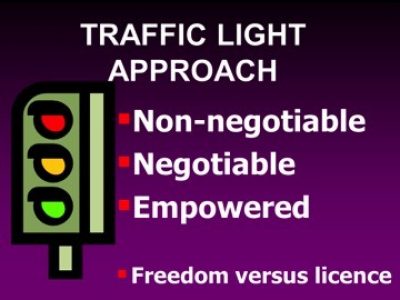Empowerment - from a presentation at the International Democratic Education Conference in Bangalore India

At the end of November I attended the International Democratic Education Conference in Bangalore India. As part of the presentation that I made I explored the notion of empowerment. I used the model shown below which summarises the way in which we think about empowerment in Self Managed Learning College. It uses the idea of traffic lights to highlight the difference between non-negotiable, negotiable and empowered activity.
Like any organisation we have some non-negotiable elements. These include that we start the day with our community meeting. However what people say in the community meetings is up to the individual. They are empowered to say whatever they like about anything provided that they adhere to a few simple rules that the community has agreed. The rules were negotiated between students and learning advisors. At the beginning of each term we revisit these rules and then what is negotiated and agreed is posted on the wall and everybody signs up to the agreed rules. These become then temporarily non-negotiable until next time we want to negotiate changing the rules.
Students are empowered to undertake any learning they want. However if they need resources such as a room or the time of a learning advisor, they may have to negotiate this. Once they’ve negotiated a particular time to use a room, or to have time to work with a learning advisor, then they are empowered to get on with it and to engage in whatever learning they want to undertake. Unlike in school our students can go anywhere in the building provided they are not interfering with other people’s activities. It has been interesting when we talk to new students, who have been in school, that one of the things they comment on is the fact that they can go to the toilet when they want without having to put their hand up and that they can go into the kitchen any time they want to get themselves a drink or something to eat. They are empowered to do this.
One non-negotiable is that everyone is in a learning group of five or six students with one of the learning advisers there to assist the group. In the group, individuals are empowered to say what they like in any way they want provided they stick to the ground rules that the group agrees. Once the group has negotiated these ground-rules they become temporarily non-negotiable. Within those rules individuals can say what they like. One of the rules generally is that participants should respect other people in the room e.g. by not interrupting them when they’re speaking. However in terms of the content of what people talk about it’s entirely up to the individual – they are completely empowered in this respect.
Another thing that new students comment on is the fact that they can genuinely ask for anything and pursue any learning they want. However there is a distinction between what some writers call ‘freedom versus licence’. That is, students are free to learn whatever they want and to move around the building but not free to interrupt other people’s learning. This would be a distinction between freedom and licence.
This issue of empowerment is important because it occurs to me that many of the schools at the conference that would claim to be democratic, by virtue of having votes, for instance, about aspects of the of the running of the school, don’t really empower students to learn whatever they want. They may still have classrooms and a timetable; it’s just that students may have the freedom not to attend classes. For me the most important thing is the empowerment to learn anything in any way that the person wants, provided that they negotiate any resource or other constraints.
Self Managed Learning is about people managing their own learning but with support. It isn’t a complete free for all as there does need to be negotiation about how we do things. We also have the law of the land that has to apply. In this sense it is non-negotiable. For instance, stealing or acts of violence are against the law and therefore don’t need to be discussed because they are non-negotiable. Our community has to operate in a context which we must respect.
Conclusion
The distinctions I am making are important. New students coming to the College often find that it takes time to adjust. The notion that asking for anything is acceptable seems strange to individuals who have been used to a context where they are discouraged from asking – for anything. And then they might need to recognise that getting what you want might need a negotiation. Our aim is always to try to find a way to empower students to get on with whatever they like and minimise constraints. However having a few negotiated rules helps students to know the boundaries that they need to work within.
Ian Cunningham, Dec 2018


